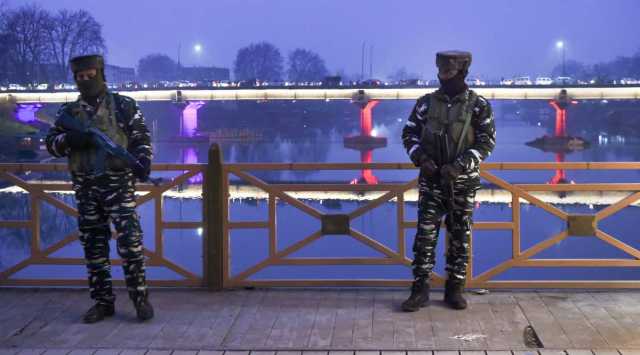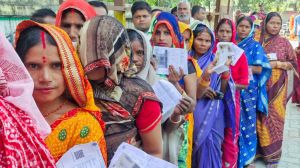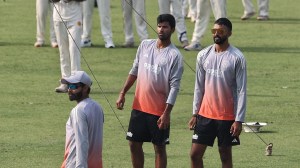Delimitation Commission proposes six additional seats for Jammu, one for Kashmir valley
NC, PDP, JKAP express disappointment, term the proposal "unacceptable".
 Security personnel stand guard during high alert after a millitant attack at Zewan in which 3 policemen were killed and 11 others were injured, in Srinagar, Tuesday, Dec. 14, 2021. (PTI Photo)
Security personnel stand guard during high alert after a millitant attack at Zewan in which 3 policemen were killed and 11 others were injured, in Srinagar, Tuesday, Dec. 14, 2021. (PTI Photo)THE DRAFT PAPER of the Delimitation Commission has proposed seven additional Assembly seats for Jammu and Kashmir — six in Jammu division and one in Kashmir valley. For the first time, the commission proposed reserving nine seats for Scheduled Tribes (STs) on the basis of population. Seven seats are proposed for the Scheduled Caste (SC) community.
With the proposed addition, the total Assembly constituencies in Jammu and Kashmir has risen to 90 — in Jammu, the number of seats has gone up to 43 from 37, and in Kashmir, by one seat to 47.
An additional 24 seats are proposed to be reserved for Pakistan-occupied Kashmir (PoK).
Of the seven additional Assembly constituencies in the Union Territory, sources said, one each has been proposed in the districts of Kathua, Samba, Rajouri, Reasi, Doda and Kishtwar in Jammu division, and Kupwara in the Kashmir valley. In a statement, the Commission said it has proposed carving out an additional constituency in some districts to balance the representation for geographical areas with inadequate communication and lack of public conveniences given their excessive remoteness or inhospitable conditions on the international border.
 Union Minister Dr Jitendra Singh at Ashok Hotel after attending the second meeting of Delimitation Commission in New Delhi in New Delhi on Monday.
Union Minister Dr Jitendra Singh at Ashok Hotel after attending the second meeting of Delimitation Commission in New Delhi in New Delhi on Monday.
The Delimitation Commission chaired by Justice (Retd.) Ranjana Prakash Desai met Monday with a detailed presentation on the work done so far by Senior Deputy Election Commissioner Chandra Bhushan Kumar. Chief Election Commissioner Sushil Chandra and J&K Election Commissioner KK Sharma are the two ex-officio members in the panel.
The meeting saw the participation by all three MPs of National Conference and two MPs of the Bharatiya Janata Party (BJP) who are Associate Members in the panel. The parliamentarians from NC had stayed away from the first meeting of the Commission on February 18 this year.
The draft recommendation of the J&K delimitation commission is unacceptable. The distribution of newly created assembly constituencies with 6 going to Jammu & only 1 to Kashmir is not justified by the data of the 2011 census.
— Omar Abdullah (@OmarAbdullah) December 20, 2021
In a statement after the meeting, the Delimitation Commission said it had shared a paper describing the proposed seat allocation with all members with a request to furnish their views and suggestions in the next 10 days by December 31.
Barring the Bharatiya Janata Party (BJP), the mainstream political parties have termed the draft proposal as “unacceptable” and accused the Commission of following the BJP political agenda.
Hasnain Masoodi, a National Conference MP, and Associate Member of the panel said, “They have proposed seven more seats – six in Jammu and one in Kashmir. It has also proposed reserving nine seats for the ST community and seven for the SC.”
My apprehensions about the Delimitation Commission werent misplaced. They want to pitch people against each other by ignoring the population census & preposing 6 seats for one region & only one for Kashmir. https://t.co/Dbs1Mny3iE
— Mehbooba Mufti (@MehboobaMufti) December 20, 2021
Masoodi said the NC members told the Commission that the J&K Reorganisation Act, under which the exercise was being done, was sub judice. “We told her (the Chairperson) she herself is a judge and knows the case is pending in the Supreme Court. She acknowledged it… We told them this is unacceptable and any exercise should be based on the 2011 Census. They (the Commission) told us to submit our suggestions and concerns,” he said.
Besides Masoodi, the other MPs in the panel are Farooq Abdullah and Mohammad Akbar Lone of National Conference, and Union Minister Jitendra Singh and Jugal Kishore Sharma of the BJP. Chief Election Commissioner Sushil Chandra and J&K State Election Commissioner K K Sharma are the ex-officio members of the delimitation panel.
The proposed increase of six seats in Jammu division was on expected lines, political observers in Jammu said. While no new constituency has been proposed in Jammu district which has 11 seats, the BJP may get a boost in Pir Panjal and Chenab Valley regions since seats are proposed to be reserved for the first time for STs comprising the Gujjar and Bakarwal communities. Forming the third largest ethnic group after Kashmiris and Dogras in J&K, the two groups reside largely in the border districts of Rajouri and Poonch, besides Anantnag, Ganderbal and Bandipora areas of Kashmir.
Even without any political reservation, seven Gujjar leaders were elected to the Legislative Assembly from Jammu division, especially Rajouri and Poonch districts, besides one from Kangan in Kashmir, during the 2014 elections.
In his presentation, Senior Deputy EC Chandra Bhushan Kumar said, since the last delimitation, the number of districts had increased from 12 to 20, and the number of tehsils from 52 to 207. The Commission has categorised the 20 districts into three broad categories: A, B, and C, giving a margin of 10 per cent of the average population per constituency while allocating seats to the districts.
Although the Commission was tasked to finish the delimitation exercise in a year, it was granted a year’s extension on March 4 this year. This followed a request by the panel members since not much progress could be made due to the Covid-19-induced shutdown.







